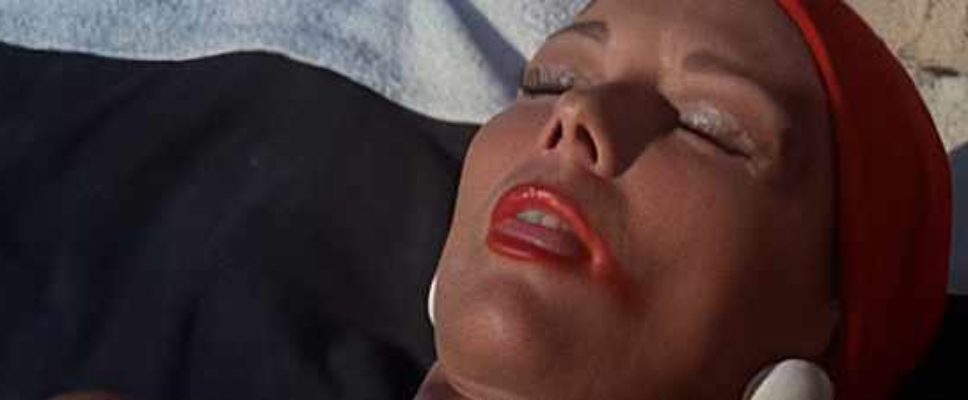Teresa Reviews “Evil Under the Sun” (1982)
Fidelity to text: 3 stranglers
![]() The usual condensing of characters, revising the location, plus a sex-change and new occupations to ramp up the show biz aspects. But it’s all in service to the story.
The usual condensing of characters, revising the location, plus a sex-change and new occupations to ramp up the show biz aspects. But it’s all in service to the story.
Quality of movie on its own: 4 stranglers although Bill wouldn’t agree
![]() This was a terrific bitch-fest; sharp, witty, caustic. Everyone got in great lines. Agatha’s plot, however, didn’t quite work.
This was a terrific bitch-fest; sharp, witty, caustic. Everyone got in great lines. Agatha’s plot, however, didn’t quite work.
Read more of Teresa’s Agatha Christie movie reviews at Peschel Press.
Also, follow Teresa’s discussion of these movies on her podcast.

There’s plenty more eye candy to go around in Peter Ustinov’s second outing as Hercule Poirot. Maggie Smith as Daphne Castle and Diana Rigg as Arlena Marshall are just the beginning and my, how those women despise each other. You can tell they’ve got a long history between them. Both of them worked their way up from the chorus, using similar methods, but Daphne got the better deal. As the King of Tyrania’s mistress, she got his summer palace when he married for “services rendered.” That turned her into an exclusive innkeeper catering to the rich. Hard work to be sure, but better than relying on a string of men as you age and your looks fade.
That appears to be Arlena Stuart Marshall’s fate. She’s a former Broadway star, married to a man she doesn’t love, stepmother to a daughter she despises (the feeling is mutual) and chasing after handsome, younger men.

However, Arlena is able to escape the fate of becoming an aging and embarrassing caricature of herself by getting murdered. She has a torrid affair with the wrong man, he steals from her and she doesn’t realize what happened. But he does.

Thus, Miss Brewster, spinster, becomes Rex Brewster, writer, raconteur, and man-about-town. Does he make you think of Noel Coward, getting all the best lines? He should. Like the rest of the cast, it’s clear Roddy McDowall had a blast.

Similarly, the Gardeners are made over into a pair of Broadway producers, chasing after Arlena to star in their next production. She can open a show like nobody else. How do they know? Because Arlena starred in their last show, it opened to rave reviews and boffo box office and then a few weeks later, she walked out, leaving them and the rest of the cast in the lurch and debt to the rafters. They need Arlena desperately to recoup their losses but is she interested? Not a chance.
Then there’s Patrick Redfern. He’s a handsome man, well-aware of his attractiveness, so Arlena doesn’t have to work hard at chasing him. It’s a mutual attraction on full, immoral display, much to the dismay of her husband, Kenneth, and his wife, Christine, and the caustic amusement of the rest of the guests. Is Kenneth happy? Not at all. Is Christine amused? Not one bit. Arlena makes both of them angry and bitter.
It’s no real surprise when Arlena is murdered. Eventually, she makes an enemy of almost everyone she encounters. The question is who did it, when everyone is proved to have an alibi for when the murder must have occurred.
This is where the plot didn’t work for me.
In the novel, the murder takes place on a very tight timetable. The murderers have to work closely together, coordinating their actions along with their unimpeachable and unsuspecting witnesses to make the scheme work. When I read the novel, I didn’t have a problem following along and accepting the distances that had to be traversed in order for one person to be in two places at once.


This inability to suspend disbelief is not a fault of the director or the cast. They had to work within the constraints of the plot as set out by Agatha when she wrote the novel. Some of the changes actually made the plot more plausible than the novel (Christine waving over the cliff instead of Christine prancing across a narrow suspension bridge and Christine tossing the bottle into the sea instead of into the garden).
But other than that, I loved this movie. Everything worked for me from the opening murder on the moors to the dénouement when the murderers are hauled off to jail. This film even supplied a joke reused in the David Suchet Poirot episode The Disappearance of Mr. Davenheim. Very early on, Poirot arrives at the insurance company to report that they must pay the death benefits to the husband of the murdered woman found on the moors. He’s announced by the secretary as Hercules Parrot.


